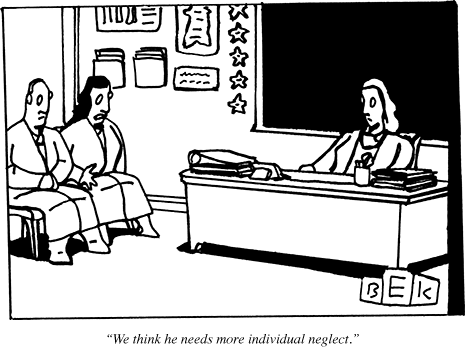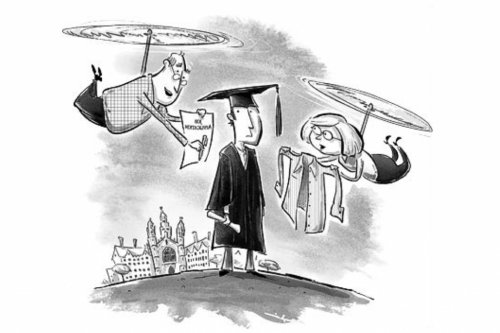
A doozie of a note from The Washington Post earlier this month, one raised that raised the collective blood pressure of Academic Twitter and Parent Twitter at the same time. It is the time of year, after all, when college students are either validated or terrified by their choice of major. As infamous weed-out professors once again earn their tough reputations, it turns out that this year’s crop of freshmen are, more than ever, forced into their major by their parents. George Mason professor Steven Pearlstein writes:
“I have heard from many different colleges that there is now a considerable — and disturbing — amount of parental pressure against the liberal arts,” reports Debra Humphreys, a senior vice president at the Association of American Colleges and Universities. One reason for the “explosion” of double majors — as high as 40 percent of students at some elite schools — is that students want one major to satisfy Mom and Dad and another to satisfy their own interests, she says.
Parents are becoming more deeply engaged in nearly every aspect of their children’s lives, and it’s carrying over even to their choice of major. “A lot of our students feel parental pressure to go into business, economics, medicine,” says Christy Buchanan, who heads the office of academic advising at North Carolina’s Wake Forest University, a traditional liberal arts college that recently announced new programs in biomedical sciences and engineering. Buchanan, a psychology professor who studies the role of families in adolescent development, says this is what “helicopter parenting” has come to.
…For me, there’s nothing more depressing than meeting incoming freshmen at Mason who have declared themselves as accounting majors. They’re 18 years old, they haven’t had a chance to take a course in Shakespeare or evolutionary biology or the history of economic thought, and already they’ve decided to devote the rest of their lives to accountancy. It’s worth remembering that at American universities, the original rationale for majors was not to train students for careers. Rather, the idea was that after a period of broad intellectual exploration, a major was supposed to give students the experience of mastering one subject, in the process developing skills such as discipline, persistence, and how to research, analyze, communicate clearly and think logically.
The article goes on at length quoting stats about Liberal Arts Majors and job placement statistics. The fact still remains — people tend to get short of breath when you talk about dropping $80,000 on a history degree. But it’s the parents, not the students, who are the ones hyperventilating into paper bags.
It’s a social phenomenon dripping with law, and not just the law of “thou shalt become wildly successful by making oodles of cash with at STEM degree.” Parents withholding their blessing (or loan cosigning?) because of their kid’s field of study? Certainly not a recipe for well-adjusted adults per say, though I’m not sure we can blame any parents post-2008 for wanting to make sure their kid is set up with financial stability.
But there’s also the law that colleges must guarantee “a return on investment,” a dollars and cents measure of success. It’s something Pearlstein also references in his essay:
I was aware, of course, of the drift toward pre-professionalism on college campuses, of widespread concern over student debt, of stories about college-educated baristas living in basements, of governors threatening to cut off state funding for French literature and anthropology. Even so, I found it shocking that some of the brightest students in Virginia had been misled — by parents, the media, politicians and, alas, each other — into thinking that choosing English or history as a major would doom them to lives as impecunious schoolteachers.
This relatively new higher-ed economy isn’t just focused on fiances, though that’s a major part of it. Every school has also been tasked with solving the binge drinking problem, ending the sexual assault epidemic, curbing the rampant mental health decline, and establishing “safe spaces” for student peace and reflection. Expand that too to measure career placement statistics. If you ever get the opportunity, visit a college career fair on behalf of your employer. The red carpet they roll out for you deepens in hue every year.
So the parents are crushing their students with the law to “go STEM and succeed,” and Unis are getting crushed with the law to “turn these students into successes at an affordable price in a safe environment.” No wonder our campuses have binge drinking and mental health problems. It’s an ecosystem totally defined by law.
The contrast is, theoretically, the church world, where there’s a small but growing recognition that the law produces rebellion. If forcing your kid to go to Liberty or Wheaton for college doth not a Christian make, surely forcing a student to study economics does not an economist make. Which is to say, there’s not a whole lot of difference between the religious parents tossing out their kid’s Nirvana collection and the secular parents controlling their child’s college major. Perhaps the only difference is that religious parents, theoretically, have access to the insight that the law can’t engender the love it demands.
If anything, though, the article weakens as Pearlstein capitulates to the laws he bemoans. After first asserting that schools are more than pre-professionalism and career training, he follows up with the idea that employers actually want to hire students with critical thinking, mind expanding, well-rounded Liberal Arts minds:
In today’s fast-changing global economy, the most successful enterprises aren’t looking for workers who know a lot about only one thing. They are seeking employees who are nimble, curious and innovative. The work done by lower-level accountants, computer programmers, engineers, lawyers and financial analysts is already being outsourced to India and the Philippines; soon it will be done by computers. The good jobs of the future will go to those who can collaborate widely, think broadly and challenge conventional wisdom — precisely the capacities that a liberal arts education is meant to develop.
In other words, Liberal Arts educations teach the “real skills” employers want, and so they are coequal avenues with STEM degrees for long term career success. And this is a weakness because, if we know anything about the dynamics of law and control, the way to escape the law’s crushing demand is not by fulfilling it.
Can grace reign in this system of higher ed? I’m not sure, to be honest, which makes me as guilty as every other talking head for decrying a problem without offering a solution. But if there’s a solution, it’s going to have to start with extinguishing the thirst for success. When God the Father’s “well done, good and faithful servant” is guaranteed by the work of Jesus, it redefines success in a way that the world doesn’t get. The Apostle Paul had little good to say about his “higher ed” experience with Gamaliel (Acts 22, Phil 3), and when your religion suggests that its own wisdom is foolishness to the world, it certainly takes the edge off of the perfect college experience. Which is to say, as long as our fields of study are expected to save us, they won’t. As long as our Universities are expected to save us, they won’t. And the pressures we exert on these institutions to fill the “God shaped holes in our heart” will render them doubly ineffective at the wisdom-imbuing function they were designed to provide.

COMMENTS
Leave a Reply















